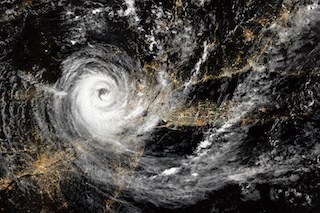Now that I live in Florida, I pay a lot more attention to hurricane season than I used to. The season started early this year, which put me in mind of the lessons I learned when Superstorm Sandy hit New York City in 2012.
At the time, my husband and I were living in midtown Manhattan, in a section that was without power from Monday evening through late Friday night, though other sections had power back sooner. We wound up “sheltering in place” for the duration with our two cats in our 16th floor apartment. I learned several lessons from the experience:
#1: Automatization prevails. Every day at about 5:00 p.m., I reached to turn on a light. Every single time I walked into a dark closet, I reached for the light switch. Every morning, I looked at my electric clock for the time. As we walked out of the apartment, my husband twice asked me to call the elevator.
You can’t change these automatized reactions just because you “know” the power is off. You would need to set a standing order one at a time for each automatized reaction. After you had assiduously retrained yourself on one, you could go on to the next. Fortunately, the blackout didn’t last long enough to make that necessary!
#2: Uncertainty is extremely distracting. Theoretically, each day I had 8-10 hours or so of decent daylight, and 2 hours of battery power on the computer and our wireless internet (Mifi). You would think that would be enough to get quite a bit done.
But it turns out, I was completely distracted by the open questions floating around. Was there any news on when the power would come on? What about for the rest of the family, without power in New Jersey and Long Island? I had already been fairly distracted by following that year’s presidential race. Add these other distractions, and I was constantly tempted to turn on the radio or my phone for news.
I’m happy to say that the exception to the rule was that I was able to work on my book most days. Why? I draft by hand, so the loss of power didn’t inconvenience the process — no additional barriers there. Plus, it is the work I am most motivated to do. Motivation beats distractions every time.
#3: Eyestrain is strain. Like all other kinds of mental strain, eyestrain radically reduces your mental resources. I found I couldn’t do “thinking on paper” by candlelight, because it was too hard to read what I was writing.
We don’t think of perception as requiring effort, but when you are listening hard or peering hard, you are using up mental resources that are not available for other mental work.
#4: Paper makes thinking easier. We couldn’t print — and that definitely impacted my productivity. I was reminded of how much it helps to look at a clean copy of some information. You can read it and mark it up, and that makes it easier to think about.
My father was one of the first people to work in computers in the 60’s, and his top computer stock tip for decades was “buy paper companies.” It’s not so true anymore — the office uses much less paper than it did in its heyday — but paper still makes a difference on harder mental tasks.
#5: “No problem can withstand the assault of sustained thinking.” We were able to stay in our apartment because our superintendent put his mind to the water problem.
There was no running water in the building without electricity to pump it to the tank on the roof. Drinking water wasn’t a problem — we had stocked five gallons of drinking water and plenty of soda. Cleaning water wasn’t the problem — we used paper plates and visited friends for a shower.
Flushing water was the problem. After two days, the bathtubs were nearly empty, and we were preparing to vamoose. And then…we heard a bustle of activity in the hall. The building staff was filling a big trash can with water. What excitement! Everybody still on the floor came out with pails to fill.
Where did they get the water? They had rigged a series of hoses from the pool on the 36th floor! They then went up and down the stairs, filling trash cans on every floor! We were lucky to have a thinker as our superintendent — who had hired sharp, practical staff to support us. You can bet the Christmas tips were extra big that December.
Bonus lesson: The cats weren’t bothered by any of this. We humans dealt with the problems so they didn’t have to.
I hope you don’t face power or water or other shortages this summer. But if you do, one way to keep values-oriented is to notice what you can learn. What have you automatized? What everyday values can you appreciate?









0 Comments